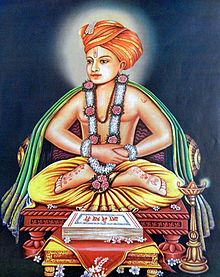Dnyaneshwar Vitthalapant Kulkarni | |
|---|---|
 | |
| Title | Sant Dnyaneshwar |
| Personal | |
| Born | Dnyaneshwar 1275 |
| Died | 1296 (aged 20–21) |
| Religion | Hinduism |
| Parents |
|
| Organization | |
| Philosophy | Advaita, Varkari |
| Religious career | |
| Guru | Nivruttinath (elder brother) |
| Literary works | Dnyaneshwari, Amrutanubhav, Changdev Paasashti, Haripath, abhang devotional poetry |
| Honors | Sant (Saint), Dev (God) and Māulī [1] |
Sant Dnyaneshwar (Marathi pronunciation: [d̪ɲaːn̪eʃʋəɾ]), also referred to as Dnyaneshwar, Dnyanadeva, Dnyandev or Mauli or Dnyaneshwar Vitthal Kulkarni (1275–1296),[2][3] was a 13th-century Indian Marathi saint, poet, philosopher and yogi of the Nath and Varkari tradition. In his short life of 21 years, he authored Dnyaneshwari (a commentary on the Bhagavad Gita) and Amrutanubhav.[4] These are the oldest surviving literary works in the Marathi language, and considered to be milestones in Marathi literature.[5] Sant Dnyaneshwar's ideas reflect the non-dualistic Advaita Vedanta philosophy and an emphasis on Yoga and bhakti towards Vithoba, an incarnation of Vishnu.[6] His legacy inspired saint-poets such as Eknath and Tukaram, and he is one of the founders of the Varkari (Vithoba-Krishna) Bhakti movement tradition of Hinduism in Maharashtra.[7][8] Dnyaneshwar undertook samadhi at Alandi in 1296 by entombing himself in an underground chamber.
- ^ Berntsen & 1988, p. 143.
- ^ Mokashi 1987, p. 39.
- ^ W. Doderet (1926), ]https://www.jstor.org/stable/607401 The Passive Voice of the Jnanesvari], Bulletin of the School of Oriental Studies, Cambridge University Press, Vol. 4, No. 1 (1926), pp. 59-64
- ^ Ranade 1933, pp. 31–34.
- ^ D. C. Sircar (1996). Indian Epigraphy. Motilal Banarsidass. pp. 53–54. ISBN 978-81-208-1166-9.
- ^ Pawar 1997, p. 352.
- ^ J. Gordon Melton (2011). Religious Celebrations: An Encyclopedia of Holidays, Festivals, Solemn Observances, and Spiritual Commemorations. ABC-CLIO. pp. 373–374. ISBN 978-1-59884-206-7.
- ^ R. D. Ranade (1997). Tukaram. State University of New York Press. pp. 9–11. ISBN 978-1-4384-1687-8.